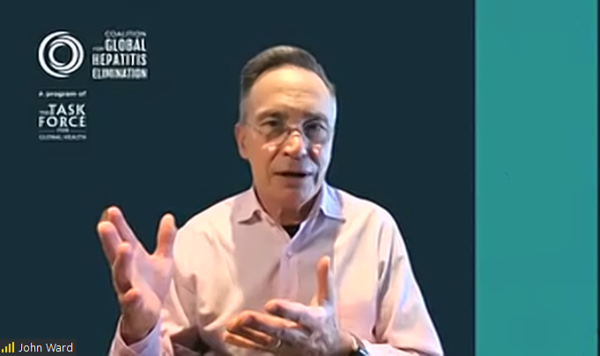Korea has the optimal situation to eradicate hepatitis C because accurate tests and highly safe and effective therapies are easily available, a hepatitis expert said.

John Ward, a director at the Coalition for Global Hepatitis Elimination (CGHE), spoke with Korea Biomedical Review in an online interview on the sidelines of the 2023 Asian Pacific Association for the Study of Liver (APASL) Congress last week.
CGHE is a non-profit group promoting global hepatitis elimination programs. Ward previously worked for the U.S. Centers for Disease Control and Prevention (CDC).
Delaying action to combat hepatitis C benefits no country, and the most important thing in eradicating hepatitis C is to cure the patient before the virus causes liver damage, Ward said.
If the detection is delayed, the virus can be treated, but the risk of future liver cancer due to the already damaged liver is low and that cannot be stopped, he added.
Ward said this is also true from a cost standpoint.
“If the patient’s symptoms progress to liver cirrhosis or liver cancer, treatment and management at that stage will inevitably result in much higher costs than the previous stage.”
Ward spoke highly of Korea’s two pilot projects to introduce national hepatitis C screening tests.
The Korea Disease Control and Prevention Agency (KCDA) confirmed the validity and cost-effectiveness of introducing a national screening test in the two pilot projects.
However, it is still uncertain whether the National Health Screening Committee will review the matter this year, sources said.
Ward said it was essential for physicians to engage with the government’s decision-makers because they need to understand that Koreans are very concerned about hepatitis C, he said.
Ward said members of the national health screening committee may not be as knowledgeable about hepatitis C or may have either conscious or unconscious perceptions of stigma for populations with an increased risk for hepatitis C.
“Therefore, it is important for clinicians to demonstrate public concern and to help educate the committee about the disease to help them make the decisions,” Ward said.
Ward evaluated that if the Korean government and medical community step up their efforts to eradicate hepatitis C, it will leave a great precedent in eradicating hepatitis C.
“Korea has a fairly well-established health care system, and in particular, it is applaudable that the country focuses on prevention of various diseases through national screening programs,” Ward said. “In that context, the country is in a good position to move forward with more regular examinations and active treatment for hepatitis C.”
8 components needed for national hepatitis eradication
Ward also presented the eight components of the national hepatitis eradication program during a session during the 2023 APASL.
They are expanding community and clinic-based testing; simplifying the treatment to expand access to hepatitis C treatment; strengthening information systems; increasing collaboration across clinical specialties; preventing hepatitis C transmission through the integration of treatment and prevention services and underserved populations; ensuring equitable access to hepatitis C prevention and treatment services for people; strengthening national responsibility to eradicate hepatitis C; and raising awareness among various stakeholders.
Of the eight, Ward stressed that four components are very relevant to Korea.
“Korea is obviously expanding access to hepatitis C, so moving it from specialty care to care that’s convenient to the patient at the primary care level is the utmost important factor,” Ward said. “Also, Korea has to focus on health equity to ensure that access to hepatitis C testing and treatment is available for everyone in the country.”
Ward stressed that Korea should also integrate hepatitis C testing throughout the health system, so it is conveniently available to the patients, and integrate hepatitis into health information systems so that testing and treatment are directed to patients with the greatest need.

